新概念英语第三册语法详解和总结(带习题)
新概念英语第三册语法
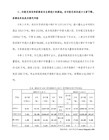
(2) If + did / were to + v ..., would + v.
(完全不可能)
If the sun were to rise in the west, I would lend you the money.
If you finished it in 3 minutes, I would give you my car.
3. 与将来事实相反的虚拟:
(1) If + should + v., ... would + v.
(可能性很小)(译作“万一”)
If it should rain tomorrow, you could stay at home.
If I should fail, what should Ido?
A. otherwise the damage would be beyond measure.
B. the damage, otherwise, should be very great.
C. the damage could have been very serious otherwise.
4. ________ he come late, give him the message.
A. Had B. Should C. Would D. Did
5. Hadn't my car broke down, I ________ the train.
A. would have caught B. might catch C. could catch D. would catch
新概念英语第三册语法精讲及练习(二):虚拟语气
新概念第三册语法总结
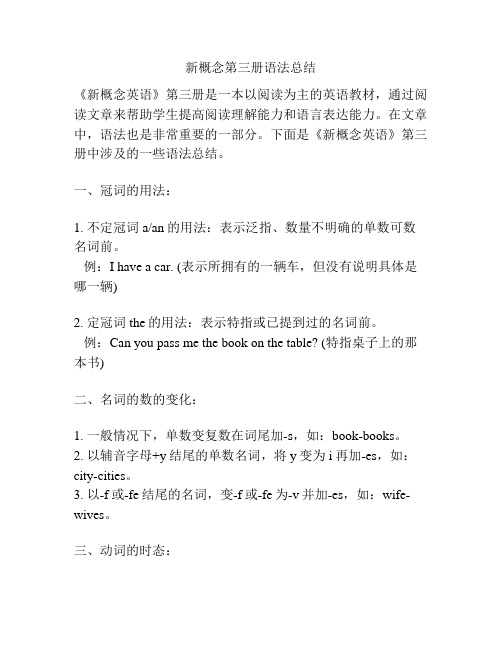
新概念第三册语法总结《新概念英语》第三册是一本以阅读为主的英语教材,通过阅读文章来帮助学生提高阅读理解能力和语言表达能力。
在文章中,语法也是非常重要的一部分。
下面是《新概念英语》第三册中涉及的一些语法总结。
一、冠词的用法:1. 不定冠词a/an的用法:表示泛指、数量不明确的单数可数名词前。
例:I have a car. (表示所拥有的一辆车,但没有说明具体是哪一辆)2. 定冠词the的用法:表示特指或已提到过的名词前。
例:Can you pass me the book on the table? (特指桌子上的那本书)二、名词的数的变化:1. 一般情况下,单数变复数在词尾加-s,如:book-books。
2. 以辅音字母+y结尾的单数名词,将y变为i再加-es,如:city-cities。
3. 以-f或-fe结尾的名词,变-f或-fe为-v并加-es,如:wife-wives。
三、动词的时态:1. 一般现在时:表示习惯性、经常性或客观真理等。
例:Water boils at 100 degrees Celsius. (客观真理)2. 一般过去时:表示过去发生或存在的动作或状态。
例:She lived in London for five years. (过去发生的动作)3. 现在进行时:表示现在正在进行的动作。
例:I am reading a book now. (正在进行的动作)4. 过去进行时:表示过去某一时间正在进行的动作。
例:He was studying when I called him. (过去某一时间正在进行的动作)5. 一般将来时:表示将来某一时间将要发生的动作。
例:I will go to the cinema tomorrow. (将来某一时间将要发生的动作)四、形容词和副词的比较等级:1. 一般形容词比较等级:例:good - better - best (好 - 更好 - 最好)2. 以-y结尾的形容词,变-y为-i,再加-er或-est:例:happy - happier - happiest (快乐 - 更快乐 - 最快乐)五、连词的用法:1. 并列连词and:用于连接并列的词、短语、从句等。
新概念英语第三册语法汇总和习题
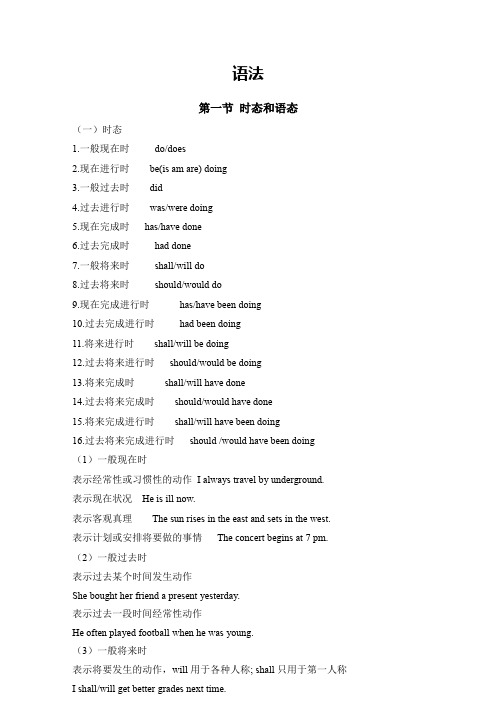
语法第一节时态和语态(一)时态1.一般现在时do/does2.现在进行时be(is am are) doing3.一般过去时did4.过去进行时was/were doing5.现在完成时has/have done6.过去完成时had done7.一般将来时shall/will do8.过去将来时should/would do9.现在完成进行时has/have been doing10.过去完成进行时had been doing11.将来进行时shall/will be doing12.过去将来进行时should/would be doing13.将来完成时shall/will have done14.过去将来完成时should/would have done15.将来完成进行时shall/will have been doing16.过去将来完成进行时should /would have been doing(1)一般现在时表示经常性或习惯性的动作I always travel by underground.表示现在状况He is ill now.表示客观真理The sun rises in the east and sets in the west.表示计划或安排将要做的事情The concert begins at 7 pm.(2)一般过去时表示过去某个时间发生动作She bought her friend a present yesterday.表示过去一段时间经常性动作He often played football when he was young.(3)一般将来时表示将要发生的动作,will用于各种人称; shall只用于第一人称I shall/will get better grades next time.Your parents will be glad to hear that you return home."am / is / are going to+动词原形”用来表示事先考虑过的将要发生的动作Jean is going to meet me at the airport.”be doing”表示根据现在计划或安排做某事I am taking Jane out of dinner tonight.be+(about) to do, 表示近期内要做的事情注意:不能与时间状语连用The new school year is about to start.难点:主将从现时间状语从句:when, whenever, since, till, once, as soon as, while, as ,before, afterI will be an English teacher when I grow up.条件状语从句:if, unless, as long as, so long asIf I have extra money, I will pay the bill for you.(4)现在进行时目前在做的动作He is studying physics very hard these days.现阶段在进行动作I hear you are writing a novel.与always, forever, constantly,continually表达有感情色彩的词汇He is forever asking silly questions like a stupid guy.(5)过去进行时过去某个时刻正在进行动作We were taking photos on the mountains.过去某段时间内的动作I was talking about the new book yesterday morning.(6)将来进行时将来某个时刻正在进行动作When I get home, my mother will be cooking dinner.计划将来要发生的事情She will be studying French at college this time next year.(7)现在完成时已经完成某事,过去的动作对现在有影响We have just e back from the United States.表示过去某一行为持续到现在,可能继续持续下去They have been best mates since school.have been to 曾去过某地,现在已经不在have gone to 已经去了某地,现在可能还在去的路上My father has been to Beijing.My father has gone to Beijing.固定句型:It is the+序数词+time that sb have/has done sth“这是某人第几次去......”It is the first time that his painting has been displayed to the public.(8)过去完成时“过去的过去”:过去某个时间开始一直延续到过去另一个时间的动作I had read half of the book by yesterday.By the time they finished the job, we had reached more.固定句型:It was the+序数词+time that sb had done sth“这是某人第几次去......”It was the second time that I had met the same kind of problem.固定句型:no sooner+过去完成时+than+一般过去时hardly+过去完成时+when+一般过去时scarcely+过去完成时+when+一般过去时“一......就......”They had no sooner reached the office than it began to rain.=They had hardly reached the office when it began to rain.=They had scarcely reached the office when it began to rain.表示过去未曾实现的愿望,与动词intend, mean, plan, hope, wish, want, think, expect 连用I had meant to e ,but something happened.(9)现在完成进行时过去某一时间开始持续到现在,并且继续持续下去I have been waiting for an hour, but he still hasn’t turned up.(10)将来完成时表示将来某时刻之前或某动作前已经发生的动作We shall/wiil have met that manager by next Monday.表示一个持续到将来某时之前或某动作发生之前的动作By next Monday, she will have studied here for three years.(11)过去完成进行时过去某个时间或动作之前一直进行的动作He had been writing this novel up to that time.(12)过去将来时:过去某事看将来要发生的动作John said he would have a rest the next day.(二)语态(1)英语语态:主动语态、被动语态He opened the door. 他打开了这扇门。
新概念第三册语法要点概览

新概念第三册语法要点概览引言《新概念英语》作为一套经典的英语教材,已被广泛应用于英语者中。
新概念第三册侧重于培养者的英语实际运用能力,包含了许多重要的语法点。
本文档将为您详细解析新概念第三册中的语法要点,帮助您更好地理解和掌握英语语法。
第三册语法要点概览1. 情态动词第三册中,情态动词是重要的语法点之一。
情态动词包括can, could, may, might, must, shall, should, will, would等。
它们用于表达可能性、推测、建议、意愿等含义。
在第三册的课文和练中,情态动词的用法得到了详细的阐述和练。
2. 时态第三册中涵盖了各种时态的用法,包括一般现在时、一般过去时、一般将来时、现在进行时、过去进行时、现在完成时、过去完成时等。
通过对课文中不同时态的例句和练题的解析,者可以深入理解时态的用法和区别。
3.被动语态被动语态是英语中常用的语法结构,用于强调动作的承受者。
第三册中,被动语态的构成和用法得到了详细的讲解。
者可以通过课文中的例句和练题来掌握被动语态的正确使用。
4. 虚拟语气虚拟语气是用来表达假设、愿望、建议等非现实情况的语法结构。
在第三册中,虚拟语气的用法得到了详细的阐述,包括if条件句、wish后的宾语从句、建议句等。
5. 定语从句定语从句是英语中常用的语法结构,用于修饰名词或代词。
第三册中,定语从句的引导词、用法和注意事项得到了详细的讲解。
者可以通过课文中的例句和练题来掌握定语从句的正确使用。
6. 状语从句状语从句是用来修饰动词、形容词、副词等词性的语法结构。
第三册中,状语从句的种类、用法和连接词得到了详细的讲解。
者可以通过课文中的例句和练题来掌握状语从句的正确使用。
结论新概念第三册涵盖了丰富的语法要点,通过和掌握这些语法点,者可以提高自己的英语语法水平,并更好地运用英语进行交流。
希望本文档能够为您提供参考和帮助,祝您进步!。
新概念3知识点总结
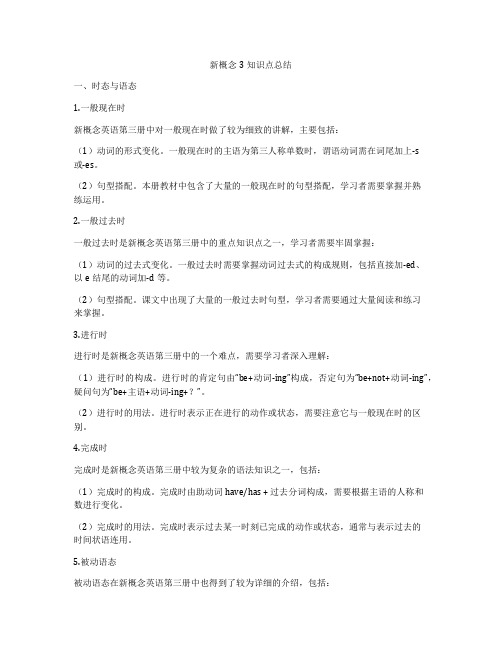
新概念3知识点总结一、时态与语态1.一般现在时新概念英语第三册中对一般现在时做了较为细致的讲解,主要包括:(1)动词的形式变化。
一般现在时的主语为第三人称单数时,谓语动词需在词尾加上-s或-es。
(2)句型搭配。
本册教材中包含了大量的一般现在时的句型搭配,学习者需要掌握并熟练运用。
2.一般过去时一般过去时是新概念英语第三册中的重点知识点之一,学习者需要牢固掌握:(1)动词的过去式变化。
一般过去时需要掌握动词过去式的构成规则,包括直接加-ed、以e结尾的动词加-d等。
(2)句型搭配。
课文中出现了大量的一般过去时句型,学习者需要通过大量阅读和练习来掌握。
3.进行时进行时是新概念英语第三册中的一个难点,需要学习者深入理解:(1)进行时的构成。
进行时的肯定句由“be+动词-ing”构成,否定句为“be+not+动词-ing”,疑问句为“be+主语+动词-ing+?”。
(2)进行时的用法。
进行时表示正在进行的动作或状态,需要注意它与一般现在时的区别。
4.完成时完成时是新概念英语第三册中较为复杂的语法知识之一,包括:(1)完成时的构成。
完成时由助动词have/has + 过去分词构成,需要根据主语的人称和数进行变化。
(2)完成时的用法。
完成时表示过去某一时刻已完成的动作或状态,通常与表示过去的时间状语连用。
5.被动语态被动语态在新概念英语第三册中也得到了较为详细的介绍,包括:(1)被动语态的构成。
被动语态由be动词(am/is/are/was/were)+ 过去分词构成,需要根据主语的人称和数进行变化。
(2)被动语态的用法。
被动语态用于强调动作的承受者,需要根据句意来选择主动语态或被动语态。
二、词汇与短语1.词汇新概念英语第三册中的词汇主要包括了基础的日常生活词汇和高级语法知识相关的词汇,如形容词、副词、动词不规则变化等,需要学习者结合上下文理解和记忆。
2.短语本册教材中出现了大量的常用短语,包括表示时间、地点、方式、原因等各种短语,学习者需要通过大量的实践运用来加深记忆和理解。
新概念英语第三册 Lesson 3 文章词汇语法详细解析
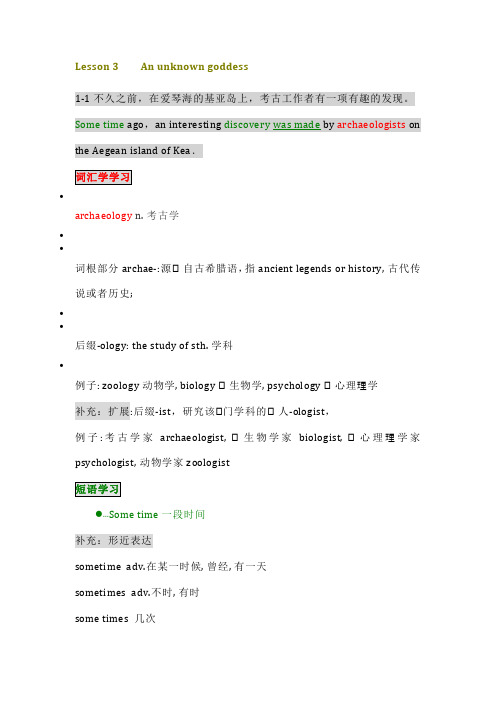
•archaeology n. 考古学••词根部分archae-:源⾃自古希腊语,指ancient legends or history, 古代传说或者历史;••后缀-ology: the study of sth. 学科•●∙∙∙Some time 一段时间补充:形近表达sometime adv.在某一时候, 曾经, 有一天sometimes adv.不时, 有时some times 几次•stand(vi.) 此处表示“坐落于”“位于”“(高贵)矗立于” be located in•A great tree stands on the mount. 一棵大树竖立在山上。
There is a temple standing on the top of the mountain. 山顶上有座寺庙。
A row of willows stands on the riverside. 河边长着一排柳树。
补充:同义表达lie (vi.) ; situate(vt.); Locate(vt.) 使...坐落于, 位于which stands in... = which lies in… = which is located in… = which is situated in...补充:stand其他用法Stand 做动词还可以表示“身高”。
She stands 1.75m. 她身高1.75米She stood three feet high and her hands rested on her hips. 她身高三英尺,双手叉腰。
1-3 这座古城肯定一度很繁荣,因为它曾享有高度的文明,The city at one time must have been prosperous,{for it enjoyed a high level of civilization}.生词学习●∙∙∙prosperous adj. (经济上)繁荣的,昌盛的Our finance is prosperous. 我们的经济非常的繁荣。
新概念英语第三册课后练习答案及解析(Lessons10_12 )
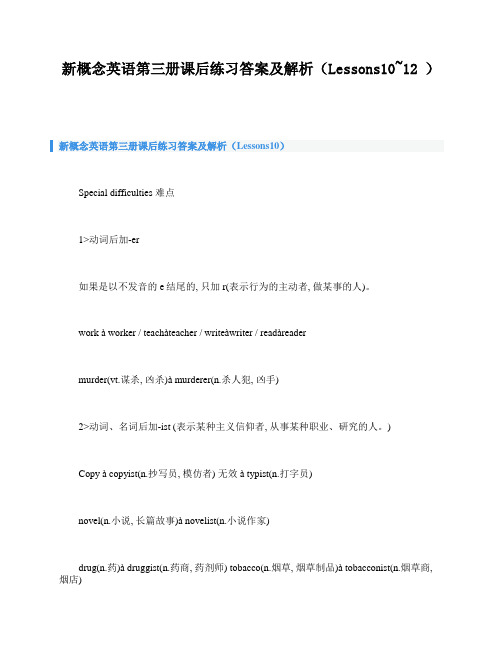
新概念英语第三册课后练习答案及解析(Lessons10~12 )新概念英语第三册课后练习答案及解析(Lessons10)Special difficulties 难点1>动词后加-er如果是以不发音的e结尾的, 只加r(表示行为的主动者, 做某事的人)。
work à worker / teachàteacher / writeàwriter / readàreadermurder(vt.谋杀, 凶杀)à murderer(n.杀人犯, 凶手)2>动词、名词后加-ist (表示某种主义信仰者, 从事某种职业、研究的人。
)Copy à copyist(n.抄写员, 模仿者) 无效 à typist(n.打字员)novel(n.小说, 长篇故事)à novelist(n.小说作家)drug(n.药)à druggist(n.药商, 药剂师) tobacco(n.烟草, 烟草制品)à tobacconist(n.烟草商, 烟店)3 >形容词后加-ness(抽象名词, 表示一种性质、情况、状态)kind à kindness(n.仁慈, 亲切, 好意, 善意) bitter à bitterness(n.苦味, 辛酸, 苦难) happy àhappiness(n.幸福, 快乐)--- 以结尾要变y为i加ness. willing(adj.乐意的, 自愿的)àwillingness(n.自动自发,积极肯干)4>某些动词后加-ion,构成名词。
Suggest à suggestion possess(vt.占有, 拥有, 持有)àpossession(n.拥有, 占有)collect à collection(n.收藏, 搜集品)以-te结尾的动词, 把不发音的-e去掉, 在加-ion.Translate(vt.翻译, 解释, 转化) à translation(n.翻译, 译文, 转化)complete à completion(n.完成)graduate(v.(使)(大学)毕业)à graduation(n.毕业, 毕业典礼)某些以-aim/-ain结尾的动词、把-i去掉,在加-ation.Explain(v.解释, 说明)à explanation(n.解释, 解说, 说明) Exclaim(v.呼喊, 惊叫, 大声叫)àexclamation(n.惊叫, 喊叫)5>(以-able/-ible结尾的)形容词之后加-ity变成(以-ability/-ibility结尾的)抽象名词 (表示性质、状态) able à ability probable(adj.很可能的, 大概的)à probability(n.可能性, 或然性, 概率)possible(adj.可能的)à possibility(n.可能性, 可能发生的事物)mobile(adj.可移动的, 机动的)à mobility(n.活动性, 灵活性, 机动性) Exercise:Violin(n.小提琴)à violinist(n.小提琴演奏者, 小提琴家)Responsible(adj.有责任的, 可靠的)à responsibility(n.责任, 职责)Careless(adj.粗心的, 疏忽的) à carelessness1> physics(n.物理学)à physicist(n.物理学者, 唯物论者)2> mine(n.矿v.开采, 开矿)à miner(n.矿工)3> human(n.人类adj.人类的)à humanity(n.人性, 人类)4> impress(vt.留下印象)à impression(n.印象, 感想)-- make a good impression5> original(adj.最初的, 原始的)à originality(n.创意, 创造性) Multiple choice questions 多项选择新概念3课后习题答案:Lesson 10 1d 2c 3a 4b 5d 6d 7b 8d 9a 10c 11b 12a新概念3课后习题解析:1. D maiden(n.少女, 处女 adj.未婚的, 纯洁的, 处女的)-- on her first = maiden voyage 首航, 处女航2. C course(n.过程, 路线, 课程)-- steep(adj.陡峭的, 险峻的)à steeply(adv.险峻地)3. A4. B on board her(her指代的是the great ship)-- on board the plane 在飞机上-- on board the train 在火车上-- on board the ship 在轮船上5. D 表示下沉的可能性6. D 有了“段时间”four days, 所以用过去完成进行时。
新概念英语第三册课后习题答案详解

-- He smoked his last cigarette with satisfaction.
-- He went home with dismay.
-- To our dismay the party proved to be a failure.
7... B despite = in spite of (可以和名词、代词、动名词搭配)
at this distance of/in time时隔已久
-- I can hardly remember him at this distance of time.时隔这么久,我几乎想不起来他了。
7…正确答案:D
except可以和名词/名词性从句进行搭配(也可是when/if引导的从句形式)
unless = if...not = except on the condition that…
when = if
--…except when they ared.
5.Where is the pencil you were playing with
Multiple choice questions多项选择
1…正确答案:D
in common adv.共有(替换了similar)
2…正确答案:B
A)只是一个具体的特定的事列,阅读理解题的时候要把握中心大意
B)large cat
in English / in pencil / in ink / in oil用颜料/ in red用红色/ in code用代码
in such a high voice用这么高的声音/ in a few words用几句话
3>表示状态、情况或处境
新概念英语第三册课后习题答案详解

Lesson 01 A Puma at large 逃遁的美洲狮Special difficulties 难点Exercises A1. at/for2. to3. to4. in5. onExercises B1. He is the man we have heard about so much.2. The shelf you put those books on has collapsed.(vi.倒塌, 崩溃, 瓦解)3.Whom did you receive a letter from特殊疑问句中whom 不能省略(本句)。
定语从句中Which以及指代人的做宾语的Whom, 在非正式用法当中可以省略。
省略时,介词不能前置到关系代词Whom, Which前,只能用于非固定的动词短语后面。
固定的动词短语look for:寻找(去掉for后look没有寻找的意思,所以介词for不能前置)非固定的动词短语look at:注视live in:居住(去掉in后live仍有居住的意思,所以介词in可以前置)This is the old house in which he lived. = This is the old house he lived in.4.This is the road we came by5.Where is the pencil you were playing withMultiple choice questions 多项选择1…正确答案:Din common adv.共有(替换了similar)2…正确答案:BA)只是一个具体的特定的事列,阅读理解题的时候要把握中心大意B)large catpersuade v.说服, 劝说3…答案正确:C做理解题时要紧扣主题、紧扣中心大意文章最后一句话总结了大意句型结构题和词汇题是每课的关键4…答案正确:CMake的用法:make somebody do(在主动语态中不定式的符号to应该省略)be made to do(被动语态中不定式的符号to必须补充完整)-- They made her wait for hours. àShe was made to wait for hours.5…答案正确:DA)把say改成claim就对了(-- People claimed to have seen the puma.)D)清楚的道明了动作发生的先后关系6…正确答案:B原句中的when引导的时间状语从句表示:-...就…(as soon as)被动:On being observed, it immediately ran away.主动:On observing her, it immediately ran away.On seeing me, he waved to me.7…正确答案:Dexcept可以和名词/名词性从句进行搭配(也可是when/if引导的从句形式)unless = if...not = except on the condition that…when = if-- …except when they are cornered. = …except if they are cornered.-- Whenever you come, you are welcome. = If ever you come, you are welcome.8…正确答案:DA)must be只是对客观现实的推测,时态不一致-- 对于过去事实推测一定要用:情态动词+ have +过去分词9…正确答案:Con more than = nothing more than = only / within = not more than10…正确答案:Bin a corner 偷偷摸摸地, 暗中地, 秘密地in a trap 落于陷阱中at an angle 不正的, 倾斜的(angle n.角, 角度, 角落, 墙角, 棱角)under cover 在遮蔽处, 秘密地, 暗中11... 正确答案:Bfishes for pleasure 钓鱼消遣travel for pleasure 外出游玩read for pleasure 阅读消遣12…on one’s own adv.独自地, 独立地, 主动地(= alone)for one’s own benefit 为了某人自己的利益。
(完整版)新概念英语第三册课后习题答案详解
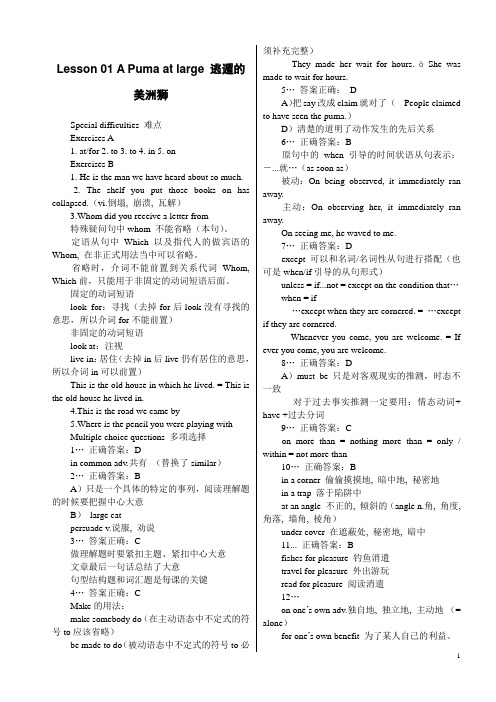
Lesson 01 A Puma at large 逃遁的美洲狮Special difficulties 难点Exercises A1. at/for2. to3. to4. in5. onExercises B1. He is the man we have heard about so much.2. The shelf you put those books on has collapsed.(vi.倒塌, 崩溃, 瓦解)3.Whom did you receive a letter from特殊疑问句中whom 不能省略(本句)。
定语从句中Which以及指代人的做宾语的Whom, 在非正式用法当中可以省略。
省略时,介词不能前置到关系代词Whom, Which前,只能用于非固定的动词短语后面。
固定的动词短语look for:寻找(去掉for后look没有寻找的意思,所以介词for不能前置)非固定的动词短语look at:注视live in:居住(去掉in后live仍有居住的意思,所以介词in可以前置)This is the old house in which he lived. = This is the old house he lived in.4.This is the road we came by5.Where is the pencil you were playing withMultiple choice questions 多项选择1…正确答案:Din common adv.共有(替换了similar)2…正确答案:BA)只是一个具体的特定的事列,阅读理解题的时候要把握中心大意B)large catpersuade v.说服, 劝说3…答案正确:C做理解题时要紧扣主题、紧扣中心大意文章最后一句话总结了大意句型结构题和词汇题是每课的关键4…答案正确:CMake的用法:make somebody do(在主动语态中不定式的符号to应该省略)be made to do(被动语态中不定式的符号to必须补充完整)-- They made her wait for hours. àShe was made to wait for hours.5…答案正确: DA)把say改成claim就对了(-- People claimed to have seen the puma.)D)清楚的道明了动作发生的先后关系6…正确答案:B原句中的when引导的时间状语从句表示:-...就…(as soon as)被动:On being observed, it immediately ran away.主动:On observing her, it immediately ran away.On seeing me, he waved to me.7…正确答案:Dexcept可以和名词/名词性从句进行搭配(也可是when/if引导的从句形式)unless = if...not = except on the condition that…when = if-- …except when they are cornered. = …except if they are cornered.-- Whenever you come, you are welcome. = If ever you come, you are welcome.8…正确答案:DA)must be只是对客观现实的推测,时态不一致-- 对于过去事实推测一定要用:情态动词+ have +过去分词9…正确答案:Con more than = nothing more than = only / within = not more than10…正确答案:Bin a corner 偷偷摸摸地, 暗中地, 秘密地in a trap 落于陷阱中at an angle 不正的, 倾斜的(angle n.角, 角度, 角落, 墙角, 棱角)under cover 在遮蔽处, 秘密地, 暗中11... 正确答案:Bfishes for pleasure 钓鱼消遣travel for pleasure 外出游玩read for pleasure 阅读消遣12…on one’s own adv.独自地, 独立地, 主动地(= alone)for one’s own benefit 为了某人自己的利益。
新概念英语第三册从句语法讲解课件及习题

④.This is the very dictionary that I want to find .
• I have no idea when he will come back home. • He must answer the question whether he agrees
to it or not.
重点:同位语从句有时不是紧跟 在名次的后面
• The thought came to him ___A___Mary
3、宾语从句:
1)做及物动词的宾语 • I don’t know if(whether) it is interesting. 。 • He doesn’t care if it isn’t a fine day. (从
句是否定句时一般用if引导。 ) • I believe(that) he is honest. • I wonder whether he will come or not. • Everything depends on whether we have
interest to us all. When and where we shall do the test is still in
question. Why she left me is still a mystery to me.
为了避免头重脚轻, It 做形式主语
1. It’s necessary/important,clear +thatclause
新概念英语第三册课后练习答案及解析(Lessons10~12)
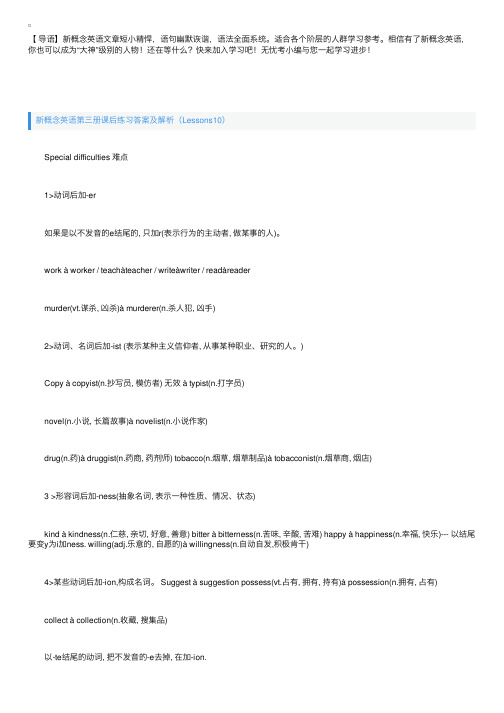
【导语】新概念英语⽂章短⼩精悍,语句幽默诙谐,语法全⾯系统。
适合各个阶层的⼈群学习参考。
相信有了新概念英语,你也可以成为“⼤神”级别的⼈物!还在等什么?快来加⼊学习吧!⽆忧考⼩编与您⼀起学习进步!新概念英语第三册课后练习答案及解析(Lessons10) Special difficulties 难点 1>动词后加-er 如果是以不发⾳的e结尾的, 只加r(表⽰⾏为的主动者, 做某事的⼈)。
work à worker / teachàteacher / writeàwriter / readàreader murder(vt.谋杀, 凶杀)à murderer(n.杀⼈犯, 凶⼿) 2>动词、名词后加-ist (表⽰某种主义信仰者, 从事某种职业、研究的⼈。
) Copy à copyist(n.抄写员, 模仿者) ⽆效 à typist(n.打字员) novel(n.⼩说, 长篇故事)à novelist(n.⼩说作家) drug(n.药)à druggist(n.药商, 药剂师) tobacco(n.烟草, 烟草制品)à tobacconist(n.烟草商, 烟店) 3 >形容词后加-ness(抽象名词, 表⽰⼀种性质、情况、状态) kind à kindness(n.仁慈, 亲切, 好意, 善意) bitter à bitterness(n.苦味, ⾟酸, 苦难) happy à happiness(n.幸福, 快乐)--- 以结尾要变y为i加ness. willing(adj.乐意的, ⾃愿的)à willingness(n.⾃动⾃发,积极肯⼲) 4>某些动词后加-ion,构成名词。
Suggest à suggestion possess(vt.占有, 拥有, 持有)à possession(n.拥有, 占有) collect à collection(n.收藏, 搜集品) 以-te结尾的动词, 把不发⾳的-e去掉, 在加-ion. Translate(vt.翻译, 解释, 转化) à translation(n.翻译, 译⽂, 转化) complete à completion(n.完成) graduate(v.(使)(⼤学)毕业)à graduation(n.毕业, 毕业典礼) 某些以-aim/-ain结尾的动词、把-i去掉,在加-ation. Explain(v.解释, 说明)à explanation(n.解释, 解说, 说明) Exclaim(v.呼喊, 惊叫, ⼤声叫)à exclamation(n.惊叫, 喊叫) 5>(以-able/-ible结尾的)形容词之后加-ity变成(以-ability/-ibility结尾的)抽象名词 (表⽰性质、状态) able à ability probable(adj.很可能的, ⼤概的)à probability(n.可能性, 或然性, 概率) possible(adj.可能的)à possibility(n.可能性, 可能发⽣的事物) mobile(adj.可移动的, 机动的)à mobility(n.活动性, 灵活性, 机动性) Exercise: Violin(n.⼩提琴)à violinist(n.⼩提琴演奏者, ⼩提琴家) Responsible(adj.有责任的, 可靠的)à responsibility(n.责任, 职责) Careless(adj.粗⼼的, 疏忽的) à carelessness 1> physics(n.物理学)à physicist(n.物理学者, 唯物论者) 2> mine(n.矿v.开采, 开矿)à miner(n.矿⼯) 3> human(n.⼈类adj.⼈类的)à humanity(n.⼈性, ⼈类) 4> impress(vt.留下印象)à impression(n.印象, 感想) -- make a good impression 5> original(adj.最初的, 原始的)à originality(n.创意, 创造性) Multiple choice questions 多项选择 新概念3课后习题答案: Lesson 10 1d 2c 3a 4b 5d 6d 7b 8d 9a 10c 11b 12a 新概念3课后习题解析: 1. D maiden(n.少⼥, 处⼥ adj.未婚的, 纯洁的, 处⼥的) -- on her first = maiden voyage ⾸航, 处⼥航 2. C course(n.过程, 路线, 课程) -- steep(adj.陡峭的, 险峻的)à steeply(adv.险峻地) 3. A 4. B on board her(her指代的是the great ship) -- on board the plane 在飞机上 -- on board the train 在⽕车上 -- on board the ship 在轮船上 5. D 表⽰下沉的可能性 6. D 有了“段时间”four days, 所以⽤过去完成进⾏时。
新概念英语第三册语法详解和总结(带习题)
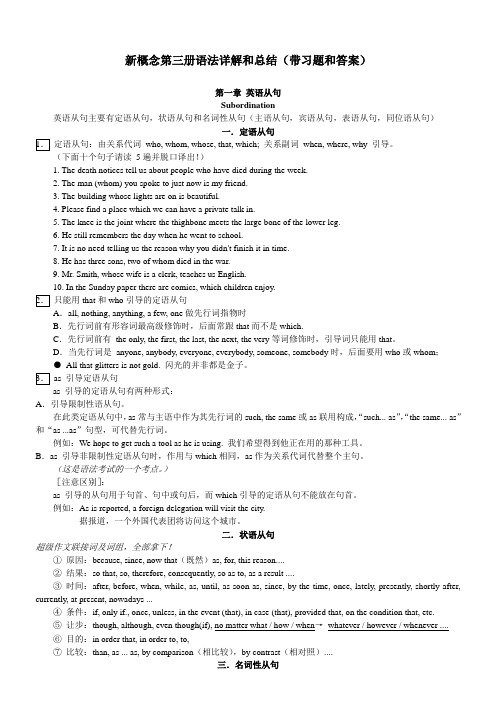
新概念第三册语法详解和总结(带习题和答案)第一章英语从句Subordination英语从句主要有定语从句,状语从句和名词性从句(主语从句,宾语从句,表语从句,同位语从句)一.定语从句定语从句:由关系代词who, whom, whose, that, which; 关系副词when, where, why 引导。
(下面十个句子请读5遍并脱口译出!)1. The death notices tell us about people who have died during the week.2. The man (whom) you spoke to just now is my friend.3. The building whose lights are on is beautiful.4. Please find a place which we can have a private talk in.5. The knee is the joint where the thighbone meets the large bone of the lower leg.6. He still remembers the day when he went to school.7. It is no need telling us the reason why you didn't finish it in time.8. He has three sons, two of whom died in the war.9. Mr. Smith, whose wife is a clerk, teaches us English.10. In the Sunday paper there are comics, which children enjoy.只能用that和who引导的定语从句A.all, nothing, anything, a few, one做先行词指物时B.先行词前有形容词最高级修饰时,后面常跟that而不是which.C.先行词前有the only, the first, the last, the next, the very等词修饰时,引导词只能用that。
新概念英语第三册语法解析汇总
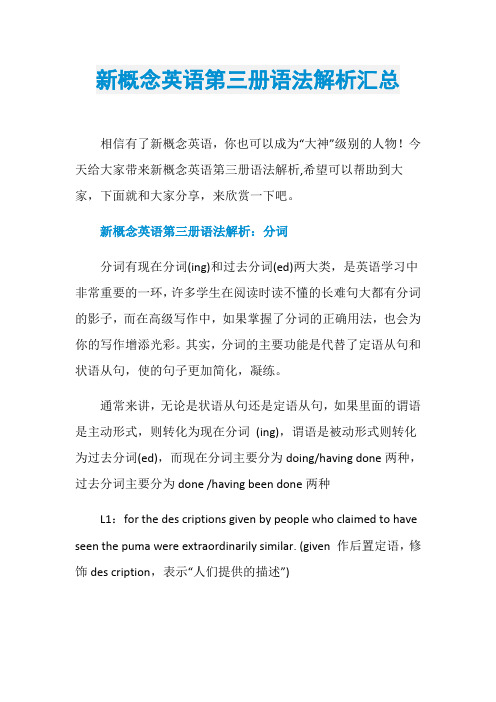
新概念英语第三册语法解析汇总相信有了新概念英语,你也可以成为“大神”级别的人物!今天给大家带来新概念英语第三册语法解析,希望可以帮助到大家,下面就和大家分享,来欣赏一下吧。
新概念英语第三册语法解析:分词分词有现在分词(ing)和过去分词(ed)两大类,是英语学习中非常重要的一环,许多学生在阅读时读不懂的长难句大都有分词的影子,而在高级写作中,如果掌握了分词的正确用法,也会为你的写作增添光彩。
其实,分词的主要功能是代替了定语从句和状语从句,使的句子更加简化,凝练。
通常来讲,无论是状语从句还是定语从句,如果里面的谓语是主动形式,则转化为现在分词(ing),谓语是被动形式则转化为过去分词(ed),而现在分词主要分为doing/having done两种,过去分词主要分为done /having been done两种L1:for the des criptions given by people who claimed to have seen the puma were extraordinarily similar. (given 作后置定语,修饰des cription,表示“人们提供的描述”)The hunt for the puma began in a small village where a woman picking blackberries saw a large cat. (picking 作后置定语,修饰woman,表示“正在采摘黑莓的女士”)L2:Looking at his watch, he saw that it was one oclock, (looking作状语,修饰主句中的动词saw,表示伴随状态) Armed with a torch, the vicar went up into the clock tower to see what was going on. (Armed作状语,由于be armed with形式所以采用过去分词,在句中作状语,修饰went up,表示伴随) L8:St. Bernard dogs have saved the lives of travellers crossing the dangerous Pass. (crossing 在这里作后置定语,修饰travellers,表示“穿越关隘的游客”)L11:even if he has five hundred gold watches hidden in his suitcase.(hidden作后置定语,修饰)L13:Not wanting to frighten the poor man, Mrs. Richards quickly hid in the small storeroom under the stairs. (wanting的否定形式在这里作目的状语)L22:Then, squinting his eyes, he said: The light is dim. Read the letter to me.(squinting作伴随状语)L24: Dropping my suit, I dashed downstairs to tellGeorge.(dropping作伴随状语,说明和dash这个动作同时发生,突出当时的恐惧之情)关于分词的用法,新概念三册随处可见这样的例子,上面列举的句子也只是新三的皮毛而已,如果同学们对分词的用法感兴趣,或者想要把它牢牢掌握,可以找出新三中其他带有分词的句子逐一分析,相信一定会大有收获。
《新概念英语》第三册课文详解及课后答案

《新概念英语》第三册课文详解及课后答案目录§ Lesson 1 A puma at large 逃遁的美洲狮 (1)§ Lesson 2 Thirteen equals one 十三等于一 (5)§ Lesson 3 An unknown goddess 无名女神 (8)§ Lesson 4 The double life of Alfred Bloggs阿尔弗雷德。
布洛格斯的双重生活 (12)§ Lesson 5 The facts 确切数字 (16)§ Lesson 6 Smash-and grab 砸橱窗抢劫 (19)§ Lesson 7 Mutilated ladies 残钞鉴别组 (23)§ Lesson 8 A famous monastery 著名的修道院 (26)§ Lesson 9 Flying cats 飞猫 (29)§ Lesson 10 The loss of the Titanic “泰坦尼克“号的沉没 (32)§ Lesson 11 Not guilty 无罪 (37)§ Lesson 12 Life on a desert island 荒岛生活 (41)§ Lesson 13 ‘It’s only me’ “是我,别害怕” (44)§ Lesson 14 A noble gangster 贵族歹徒 (48)§ Lesson 15 Fifty pence worth of trouble 五十便士的麻烦 (52)§ Lesson 16 Mary had a little lamb 玛丽有一头小羔羊 (56)§ Lesson 17 The longest suspension bridge in the world世界上最长的吊桥 (59)§ Lesson 18 Electric currents in modern art 现代艺术中的电流 (63)§ Lesson 19 A very dear cat 一只贵重的宝贝猫 (67)§ Lesson 20 Pioneer pilots 飞行员的先驱 (70)§ Lesson 21 Daniel Mendoza 丹尼尔.门多萨 (73)§ Lesson 22 By heart 熟记台词 (75)§ Lesson 23 One man’s meat is another man’s poison 各有所爱 (79)§ Lesson 24 A skeleton in the cupboard “家丑” (83)§ Lesson 25 The Cutty Sark“卡蒂萨克”号帆船 (87)§ Lesson 26 Wanted: a large biscuit tin 征购大饼干筒 (90)§ Lesson 27 Nothing to sell and nothing to buy 不卖也不买 (94)§ Lesson 28 Five pounds too dear 五镑太贵 (97)§ Lesson 29 Funny or not? 是否可笑? (101)§ Lesson 30 The death of a ghost 幽灵之死 (104)§ Lesson 31 A lovable eccentric 可爱的怪人 (107)§ Lesson 32 A lost ship 一艘沉船 (111)§ Lesson 33 A day to remember 难忘的一天 (114)§ Lesson 34 A happy discovery 幸运的发现 (118)§ Lesson 35 Justice was done 伸张正义 (123)§ Lesson 36 A chance in a million 百万分之一的机遇 (126)§ Lesson 37 The Westhaven Express 开往威斯特海温的快车 (129)§ Lesson 38 The first calender 最早的日历 (132)§ Lesson 39 Nothing to worry about 不必担心 (136)§ Lesson 40 Who’s who 真假难辨 (140)§ Lesson 41 Illusions of pastoral peace 宁静田园生活的遐想 (142)§ Lesson 43 Fully insured 全保险 (149)§ Lesson 44 Speed and comfort 又快捷又舒适 (152)§ Lesson 45 The power of the press 新闻报道的威力 (160)§ Lesson 46 Do it yourself 自己动手 (164)§ Lesson 47 Too high a price? 代价太高 (169)§ Lesson 48 The silent village 沉默的村庄 (174)§ Lesson 49 The ideal servant 理想的仆人 (176)§ Lesson 50 New Year resolutions 新年的决心 (178)§ Lesson 52 Mud is mud 实事求是 (183)§Lesson 53 In the public interest 为了公众的利益 (188)§ Lesson 54 Instinct or cleverness? 是本能还是机智 (192)§ Lesson 58 A spot of bother 一点儿小麻烦 (197)§ Lesson 59 Collecting 收藏 (199)§ Lesson 60 Too early and too late 太早和太晚 (205)§ Lesson 1 A puma at large 逃遁的美洲狮【New words and expressions】生词和短语◆puma n. 美洲狮◆spot v. 看出,发现◆evidence n. 证据◆accumulate v. 积累,积聚◆oblige v. 使…感到必须◆hunt n. 追猎;寻找◆blackberry n. 黑莓◆human being 人类◆corner v. 使走投无路,使陷入困境◆trail n. 一串,一系列◆print n. 印痕◆cling (clung, clung ) v. 粘◆convince v.使…信服◆somehow adv. 不知怎么搞地,不知什么原因◆disturb v. 令人不安学习词汇时仅知道汉语语义是不够的,要把单词放在语句中体会其应用;学习关键句型结构时则要把它放在段落结构或文章里★spot v. 看出,发现pick out / see / recognize / catch sight ofeg: A tall man is easy to spot in the crowd.He has good eye for spotting mistakes. 他有敏锐的识别错误的能力。
- 1、下载文档前请自行甄别文档内容的完整性,平台不提供额外的编辑、内容补充、找答案等附加服务。
- 2、"仅部分预览"的文档,不可在线预览部分如存在完整性等问题,可反馈申请退款(可完整预览的文档不适用该条件!)。
- 3、如文档侵犯您的权益,请联系客服反馈,我们会尽快为您处理(人工客服工作时间:9:00-18:30)。
新概念第三册语法详解和总结(带习题和答案)第一章英语从句Subordination英语从句主要有定语从句,状语从句和名词性从句(主语从句,宾语从句,表语从句,同位语从句)一.定语从句定语从句:由关系代词who, whom, whose, that, which; 关系副词when, where, why 引导。
(下面十个句子请读5遍并脱口译出!)1. The death notices tell us about people who have died during the week.2. The man (whom) you spoke to just now is my friend.3. The building whose lights are on is beautiful.4. Please find a place which we can have a private talk in.5. The knee is the joint where the thighbone meets the large bone of the lower leg.6. He still remembers the day when he went to school.7. It is no need telling us the reason why you didn't finish it in time.8. He has three sons, two of whom died in the war.9. Mr. Smith, whose wife is a clerk, teaches us English.10. In the Sunday paper there are comics, which children enjoy.只能用that和who引导的定语从句A.all, nothing, anything, a few, one做先行词指物时B.先行词前有形容词最高级修饰时,后面常跟that而不是which.C.先行词前有the only, the first, the last, the next, the very等词修饰时,引导词只能用that。
D.当先行词是anyone, anybody, everyone, everybody, someone, somebody时,后面要用who或whom;●All that glitters is not gold. 闪光的并非都是金子。
as 引导定语从句as 引导的定语从句有两种形式:A.引导限制性语从句。
在此类定语从句中,as常与主语中作为其先行词的such, the same或as联用构成,“such... as”,“the same... as”和“as ...as”句型,可代替先行词。
例如:We hope to get such a tool as he is using. 我们希望得到他正在用的那种工具。
B.as 引导非限制性定语从句时,作用与which相同,as作为关系代词代替整个主句。
(这是语法考试的一个考点。
)[注意区别]:as 引导的从句用于句首、句中或句后,而which引导的定语从句不能放在句首。
例如:As is reported, a foreign delegation will visit the city.据报道,一个外国代表团将访问这个城市。
二.状语从句超级作文联接词及词组,全部拿下!①原因:because, since, now that(既然)as, for, this reason....②结果:so that, so, therefore, consequently, so as to, as a result ....③时间:after, before, when, while, as, until, as soon as, since, by the time, once, lately, presently, shortly after, currently, at present, nowadays ...④条件:if, only if., once, unless, in the event (that), in case (that), provided that, on the condition that, etc.⑤让步:though, although, even though(if), no matter what / how / when→whatever / however / whenever ....⑥目的:in order that, in order to, to,⑦比较:than, as ... as, by comparison(相比较),by contrast(相对照)....三.名词性从句王牌要点:通常由that或疑问词导出。
1. How some mammals came to live in the sea is not know.(主语从句)2. The attorney told his client that they had little chance of winning the case.(宾语从句)3. The problem is what we'll do next.(表语从句)4. We have no idea that he has come back.(同位语从句)同位语(Appositive):同位语是英语语法的重点内容,也是各类考试中的一个考点,同时,在写作中正确运用同位语可以使你的句型更加简洁得体。
《新概念英语》第三册第一课有这样一个句子:When reports came into London zoo that a wild puma had been spotted forty-five miles south of London, they were not taken seriously.(当伦敦动物园接到报告说,在伦敦以南45英里处发现一只美洲狮时,这些报告并没有受到重视。
)在这里,a wild puma had been spotted forty-five miles south of London就是同位语从句,它本来应该放在“reports”后面,这里却被放在了谓语成分came into London zoo的后面,目的是让句型显得更为稳重。
I.简单记忆:同位语从句,就是对某些名词做进一步的解释的句子。
I was greatly shocked when I heard the news that his father died yesterday.(that 引导的句子解释了news的内容,注意:that不做任何成分)We have to face the fact that the weather is unexpectedly bad.(that 引导的句子解释了fact的内容)II.联想记忆:能接同位词从句的名词有:belief(信仰),fact,idea,doubt,rumor(谣言),evidence(证据),conclusion (结论),suggestion(建议),problem,order,answer,discovery(发现)explanation(解释),principle(原则),possibility(可能性),truth,promise(承诺),report(报告),statement(声明),knowledge(知识),opinion(观点),likelihood(可能性)[大声朗读三遍,背下即可。
]III.王牌要点:●同位语一般由that引导,但也可以用关系代词which, who, what和关系副词when, where, why, how或whether 引导。
There arouse the question whether we could win the game.I have no idea howto explain it.●一些介词词组后面也能引导同位语从句。
(非常经典之功能句式,可用于四六级和托福作文,不妨一试!):on the assumption(在……前提下),on the ground(由于……原因),on the condition that(在……条件下),with the exception(有……例外)owing to the fact(由于……事实);on the understanding(基于……理解);The young lady promised to marry the old man on the condition that he bought her a villa.那位年轻的女士答应嫁给那位老头,条件是他给她买一幢别墅。
IV.分隔式同位语从句为了使句型平衡不至于头重脚轻,有时同位语从句可以放到句子的末尾,(读两遍此定义,然后看倒句:)An idea came to him that he might write to her to ask more information about the matter.I got information from my friend that there will be a marvelous American movie "Titanic".V. 同位语从句与定语从句之区别简单记忆:定语从句的引导词that 或which在句子中用作主语或宾语,而同位语从句的引导词that只起连接主句和从句之作用,不用作任何成分。
示例:I've got an answer that A is right. (同位语从句,that 不做成分)I've got an answer that surprised me a lot.(定语从句,that做定语从句的主语)VI.王牌重点:可以充当同位语的词组或短语。
1)名词短语。
(使句型更为简洁)Bill Clinton, the president of America, came to China to pay an official visit in 1998.Lu Xun, one of the greatest essayists in China, played an overwhelmingly important role in Chinese literature history.2)动名词词组亦可用作同位语:别忘了加逗号。
